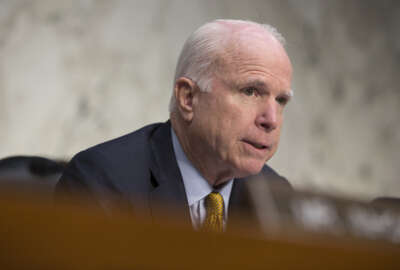
$18B defense amendment sinks in Senate
Sen. John McCain’s amendment to add $18 billion to the Defense budget, increase the military pay raise and stop cuts to the Army and Marine Corps failed passage...
Sen. John McCain’s (R-Ariz.) amendment to add $18 billion to the Defense budget, increase the military pay raise and stop cuts to the Army and Marine Corps failed passage by four votes today.
The amendment would have brought authorized spending for the 2017 defense budget to $620 billion by adding funds to the overseas contingency operations (OCO) account, an emergency wartime fund that is not fettered by budget caps.
Before the vote, McCain implored his colleagues to vote for the amendment to the 2017 defense authorization bill.
“If you vote no, don’t go home and say you support the military, because you do not,” McCain said during an impassioned speech on the Senate floor.
The amendment, which needed 60 votes, ended up 56-42. Eleven Republicans voted against the bill and 12 Democrats plus Maine Independent Sen. Angus King voted for the bill.
“Today’s vote put the lives of our men and women in uniform at greater risk. Our senior military commanders have been increasingly dire in their warnings about the grave impact of arbitrary budget cuts on our military and our national security. Those that chose to ignore those warnings will have to answer for the consequences,” McCain said in a statement after the vote.
Democrats’ main qualm with the amendment was not the military spending, but the lack of equal spending for domestic issues — a debate that echoed the fight over last year’s defense authorization bill.
Sen. Jack Reed (D-R.I.) offered a companion amendment to McCain’s, which would have added $18 billion to the domestic budget through the emergency wartime account.
That amendment failed by larger numbers.
Reed’s amendment would have funded Zika prevention, border security and local law enforcement efforts.
“Our national security is not just about being strong abroad, it is also being strong at home. A growing, vital economy allows us to meet the fiscal challenges we need to fully fund defense and to fully fund our nondefense security activities. So, as Secretary Ash Carter has said, underfunding the nondefense portion of the budget, in his words, ‘disregards the enduring long-term connection between our Nation’s security and many other factors. Factors like scientific R&D to keep our technological edge, education of a future all-volunteer military force, and the general economic strength of our country,’” Reed said.
Reed and other Democrats said they would have voted for the Defense budget increase if domestic spending was given a bump as well.
McCain’s amendment was an attempt to reconcile the Senate version of the defense authorization bill with important provisions of the House version, without going through the budget acrobatics of the House bill.
The House version takes $18 billion from OCO and moves it into the base budget. That $18 billion would be used to fund an increased military pay raise and to bolster troop levels by 27,000.
What would be left in OCO is $41 billion, instead of the original $59 billion requested by the President. That’s enough to cover the wars until April 2017.
At that point, if the new President wants more money, he can ask Congress for an additional wartime fund.
“It’s gambling with warfighting money at a time of war — proposing to cut off funding for ongoing operations in the middle of the fiscal year. Moreover, it would spend money taken from the war account on things that are not DoD’s highest priorities across the joint force,” Carter said during a speech this week. “And it’s another road to nowhere, with uncertain chances of ever becoming law, and a high probability of leading to more gridlock and another continuing resolution — exactly the kind of terrible distraction we’ve seen for years, that undercuts stable planning and efficient use of taxpayer dollars, dispirits troops and their families, baffles friends and emboldens foes.”
The White House has already threatened to veto the House version over the budgetary tactics. The Obama administration said it would veto the Senate version as well due to the required organizational reforms for DoD in the bill.
The Senate version of the bill authorizes about $3 billion more for Defense than what was appropriated in 2016.
Copyright © 2025 Federal News Network. All rights reserved. This website is not intended for users located within the European Economic Area.
Scott Maucione is a defense reporter for Federal News Network and reports on human capital, workforce and the Defense Department at-large.
Follow @smaucioneWFED





